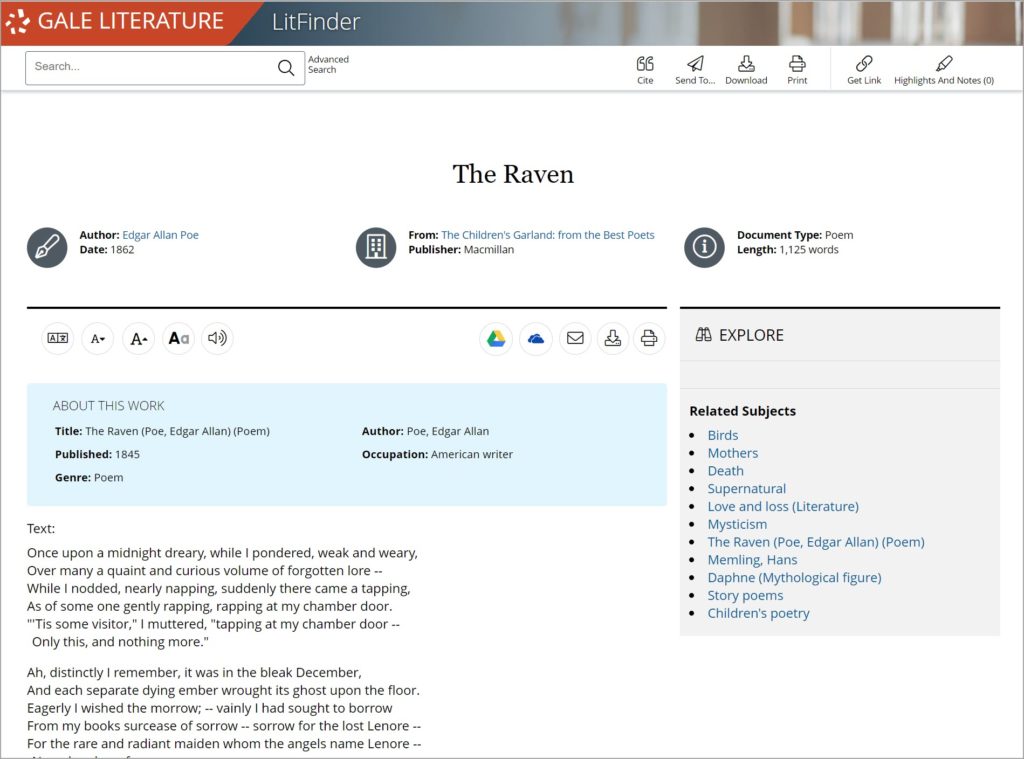| By Gale Staff |
April showers might bring May flowers, but the month of April is also a time to celebrate poetry and its intrinsic relationship with American history and culture. National Poetry Month, celebrated each year in April, was first launched in 1996. The Academy of American Poets, a nationwide organization of poets and poetry lovers, founded the holiday as a way to encourage millions of readers to read and appreciate poetry.
There are different ways in which to observe National Poetry Month. You might ask your students to create and workshop their own poems. You could host an open mic poetry slam. Or perhaps you’ll just take a moment each day to read a new poem. However, you choose to celebrate, Gale Literature: LitFinder is your number-one resource for content.
Gale’s literary anthology houses almost a million poems as well as scholarly explanations and academic criticisms. Plus, when you access each poem, you’re not only provided with the full text, background information, and citation, but you can easily navigate through related subjects. With help from Gale, you will deepen your academic research and offer your undergraduates a richer perspective into the world of poetry.
Once Upon a Midnight Dreary
There are few poems more synonymous with American poetry than Edgar Allan Poe’s The Raven. This 108-line masterpiece is a narrative poem, a work that tells the story of a man who mourns the death of his lover, Lenore. A mysterious, talking raven arrives as a symbol of his grief, chilling readers by repeating the word “nevermore” again and again. The Raven is a pristine example of the author’s more morbid themes. Poe’s literary fixation on death inspired him to write dozens of horror stories and dark poems.

Feeling compelled to perform a dramatic reading of this well-known work? You and your students will find the entire text of The Raven in LitFinder. Or, leverage the full scope of Gale’s advanced search features to explore Edgar Allan Poe’s biography. Have students discover a range of other authors who crafted poems related to love, loss, and grief. How do these artists address these themes compared to Poe’s approach?
Hope Is the Thing with Feathers
Like Poe, Emily Dickinson was notable and mysterious, though she never sought fame or recognition for her work. Dickinson wrote more than 1,000 poems, which, while simple in length and vocabulary, are incredibly complex in structure and meaning. Hope Is the Thing With Feathers is one of her better-known poems.
Use Gale Literature: LitFinder to consider how Emily Dickinson’s secluded lifestyle may have informed her poetry. She wrote without any external criticism or influence in a time when few women had such freedoms and education, yet there is plenty of critical consideration for her life and work. Find academic overviews of her more famous pieces as well as images and other forms of media. Ask your students to read Hope Is the Thing With Feathers and form their own conclusions regarding the meaning behind the puzzling poem. Do any of the critical interpretations relate to their analysis?
Some Say the World Will End in Fire
Robert Frost’s short, yet powerful piece, Fire and Ice, is a more straightforward poem when compared to the works of other more cryptic, modern American authors. Frost’s poems are almost perfectly lyrical, making them especially memorable. He was a successful, famous poet, winning the Pulitzer Prize four times and teaching at prestigious universities. Yet his private life was far more complex, with several of his children suffering from mental and physical illnesses.
Using the resources in LitFinder, have students select and explore one of Frost’s poems, developing a critical interpretation of the poem’s meaning given the additional context of the author’s struggles.
These beloved poems are just a sample of Gale’s full collection. Save yourself time and elevate your studies by using Gale Literature: LitFinder for your National Poetry Month assignments.
If your academic institution does not subscribe to LitFinder, request a trial or contact your Gale representative.

